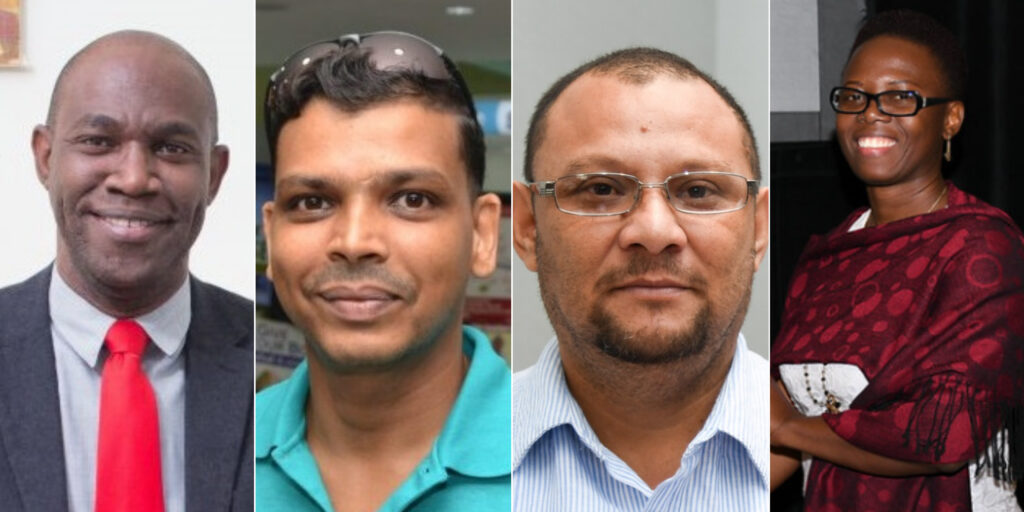
PANCAP supports over 100 Regional Programme Planners and Health Care Service Providers with Clinical Management of HIV courseSecond Batch of Students includes Nurses, Midwives, Community Health Workers, Laboratory Staff and Physicians
Wednesday, 27 April 2022 (PANCAP Coordinating Unit, CARICOM Secretariat): The Pan-Caribbean Partnership against HIV and AIDS (PANCAP), the mechanism that provides a structured and unified approach to the Caribbean’s response to the HIV epidemic, will provide over one hundred (100) programme planners and health care service providers from the Region with the opportunity to complete programmes on Clinical Management of HIV and Leadership and Management in Public Health with the Global Health E-Learning Program (eDGH), University of Washington.
Supported by the PANCAP-USAID Project via USAID Jamaica, the capacity building initiative commenced in 2021 with eighteen (18) clinical and public health practitioners completing the Clinical Management of HIV course.
The second cohort consists of sixty (60) participants from Belize, forty-five (45) from the Caribbean Vulnerable Communities Coalition (CVC) and thirty-four (34) from Guyana.
Orientation sessions held in April focused on guidance on how to utilise the virtual platform and encouraging participants to use the knowledge gained to boost the Region’s HIV response. Mr Ivan Cruickskank, Executive Director, CVC, stated that he was pleased to collaborate with PANCAP. He explained that CVC coordinated access to the Leadership and Management of Public Health course for participants from eight (8) countries, including Belize, Dominica, Jamaica, Martinique, Republic of Trinidad and Tobago, Saint Lucia, and Suriname. In addition, the Executive Director emphasised the importance of building the capacity of all players in the HIV response and viewing all stakeholders as critical contributors to ending AIDS.
Mr Enrique Romero, Executive Director, National AIDS Commission (NAC) Secretariat, Belize, underscored the importance of learning and knowledge building to Belize’s HIV National Strategic Plan (NSP). Dr Tariq Jagnarine, Programme Manager, National AIDS Programme Secretariat, Ministry of Health, Guyana, urged participants to share the knowledge gained with other Public Health stakeholders as Guyana prepares to implement several significant projects, including an HIV self-testing (HIVST) Pilot.
Dr Rhonda Moore expressed her gratitude to PANCAP and the National AIDS Programme (Guyana) for the opportunity to enhance her skills in HIV management. She stated that the course was happening at an ideal time as programme implementers are challenged with returning the focus to HIV and other Sexually Transmitted Infections (STIs) while the Region recovers from COVID-19.
Providing critical stakeholders in the HIV response with access to the courses forms part of PANCAP’s overarching strategy to protect and maintain the gains made in the HIV response.
– ENDS –
Contact:
Timothy Austin
Senior Project Officer, Communications
PANCAP Coordinating Unit
CARICOM Secretariat
Turkeyen, Greater Georgetown, Guyana
Email: taustin.consultant@caricom.org
Tel: (592) 222-0001-75, Ext. 3409 | Visit www.PANCAP.org
Helpful links:
Global AIDS Strategy 2021–2026, End Inequalities, End AIDS
https://pancap.org/pancap-documents/global-aids-strategy-2021-2026-end-inequalities-end-aids/
Caribbean Regional Strategic Framework on HIV and AIDS (CRSF) 2019-2025
https://pancap.org/pancap-documents/caribbean-regional-strategic-framework-2019-2025/
WHAT IS PANCAP?
PANCAP is a Caribbean regional partnership of governments, regional civil society organisations, regional institutions and organisations, bilateral and multilateral agencies and contributing donor partners which was established on 14 February 2001. PANCAP provides a structured and unified approach to the Caribbean’s response to the HIV epidemic, coordinates the response through the Caribbean Regional Strategic Framework on HIV and AIDS to maximise efficient use of resources and increase impact, mobilises resources and build capacity of partners.
EDITOR’S NOTES
What are the Global AIDS Strategy 2021–2026 targets and commitments?
If targets and commitments in the strategy are achieved:
- The number of people who newly acquire HIV will decrease from 1.7 million in 2019 to less than 370 000 by 2025
- The number of people dying from AIDS-related illnesses will decrease from 690 000 in 2019 to less than 250 000 in 2025.
- The goal of eliminating new HIV infections among children will see the number of new HIV infections drop from 150 000 in 2019 to less than 22 000 in 2025.
